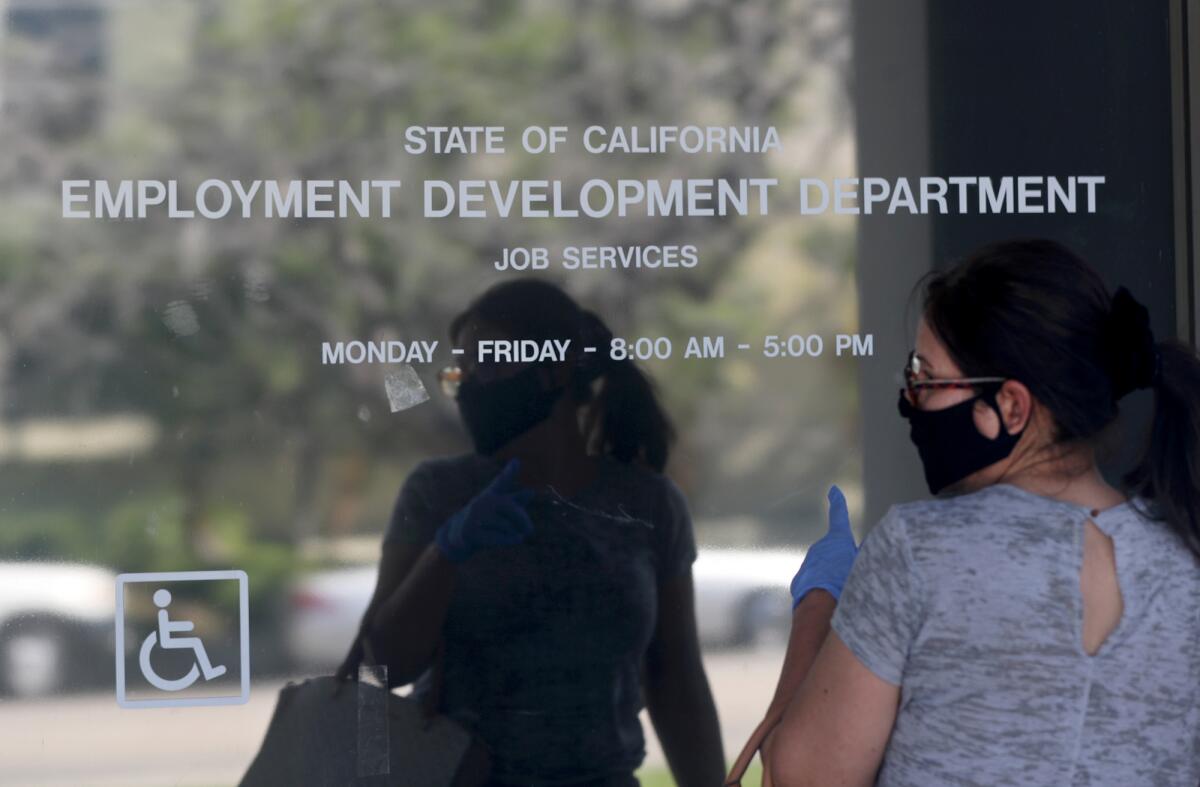California faces ‘jaw dropping’ unemployment, requiring more federal loans, Newsom says

- Share via
SACRAMENTO — Gov. Gavin Newsom says that unemployment in California amid the COVID-19 pandemic has far exceeded what it was during the peak of the Great Recession, with 4.7 million people filing for jobless benefits, requiring the state to borrow billions of dollars more from the federal government to cover claims.
At a news conference Thursday to present a revised state budget for the fiscal year starting July 1, Newsom said the state will need $43.8 billion to cover unemployment claims in the new year, a 650% increase over what was originally proposed.
The state will have to borrow much of that money from a federal trust fund that helps states cover jobless benefits in times of recession.
“These unemployment numbers are jaw dropping,” Newsom said. “We are at a time that is simply unprecedented.”
Some 4.7 million Californians have filed claims for unemployment benefits since March 12, compared to 2.2 million in the third quarter of 2010 at the height of the Great Recession.
The state’s unemployment rate is expected to peak at more than 24.5% this year but the rate for the year as a whole will be 18%, which is still higher than the 12.3% peak rate during the third quarter of 2010, Newsom added.
California faces a $9.7-billion drop in tax revenues for the fiscal year that ends in June, with a total projected deficit of $54.3 billion through the early summer of 2021.
“These are not normal numbers,” Newsom said. “These are simply without precedent in modern times.”
In boom years, California is able to pay unemployment claims from state taxes paid by employers based on the number of workers they have.
But a decades-old program allows states to borrow money from the federal trust fund for unemployment, with the money paid back over a number of years by higher employer taxes.
So far, the state has received authority to borrow $8 billion from the federal government for May and June, and officials said Thursday that much more money will be needed in the months ahead.
“The state will likely need to borrow in the tens of billions of dollars, resulting in significant future annual interest payments until the loans are repaid,” according to the new budget.
Congress has already allocated some money to help pay unemployment benefits to independent contractors, gig workers and those self-employed, who previously were not eligible to apply for regular jobless benefits. The federal legislation has also provided the unemployed with an additional $600 per week in benefits through July 31.
Still, the jobless picture has alarmed state lawmakers, including Sen. Connie M. Leyva (D-Chino), who are pressing for the state to help Californians pay their living expenses.
“Clearly, the unemployment numbers and ongoing impacts to workers and employers across our state are staggering,” Leyva said. “So I agree with the Governor that — while we need to continue to protect public education, public health and public safety — we also need to help those most impacted by COVID-19.”
Assembly Republican Leader Marie Waldron of Escondido said the state government can do much to help reduce unemployment by moving faster to restore parts of the economy shuttered by the governor’s stay-at-home order.
“The best way to fix this budget crisis is by helping people get back to work safely,” she said.
The recent flood of unemployment insurance applications has overwhelmed the antiquated computer and telephone systems set up by the state Employment Development Department to process claims.
Lawmakers on Thursday urged the governor to do more to fix problems at the EDD.
“If we need to live in the new norm, then we need to fix the problems at EDD. Californians who just lost their job should not have to endure delays and dysfunctional websites and call centers just to get UI,” Assemblyman Devon Mathis (R-Visalia) said.
Newsom’s revised budget acknowledges the problem.
“The state of this legacy system and the need to replace it has come into sharp focus during the COVID-19 pandemic as millions of Californians have accessed the system to apply for UI benefits,” the budget states.
More to Read
Sign up for Essential California
The most important California stories and recommendations in your inbox every morning.
You may occasionally receive promotional content from the Los Angeles Times.












